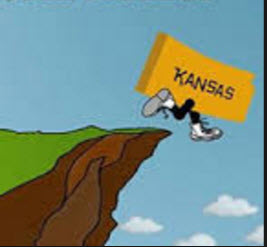 Blog
Blog
Taxes: What’s the Matter with Kansas?
June 17, 2016Thomas Frank wrote the book What’s the Matter with Kansas? in 2004, arguing that in states like Kansas conservatives have been successful in getting lower income voters to support them even though it’s against their economic self-interest.
It’s become more prescient in the last few years when states like California have hiked taxes on the rich, while Kansas slashed them—and comparatively California has boomed and Kansas plummeted (here’s one comparison of the two: https://www.washingtonpost.com/news/wonk/wp/2016/06/17/one-state-raised-taxes-the-other-cut-them-guess-which-one-is-in-recession/) . Arizona preceded Kansas with cuts beginning in 1994 that now total approximately $4 million annually—meaning our General Fund is about $9.5 billion instead of $13.5 billion, a pretty significant difference. The difference would be less if the tax cuts spurred additional economic growth.
Rob Robb had argued tax cuts have helped Arizona. We’re doing fairly well recently in terms of job growth and Phoenix’s wage levels were reasonable, especially relative to other metropolitan areas. Though I’d add it is only this year that the total number of jobs in Arizona reached its peak in 2007. But does it really have anything to do with tax cuts? Tom Rex, author of a Grand Canyon Institute report on the subject in 2013, noted that at one time Arizona’s taxes were above the national average and that didn’t dampen job creation or incomes here—and that since taxes have been slashed—Arizona hasn’t done any better—in fact, by per capita income relative to the nation, we’ve declined since 1994…And prosperity per person is a very reasonable measure of a policy’s impact. (Read Tom Rex’s piece in the Arizona Republic here: http://www.azcentral.com/story/opinion/op-ed/2016/06/15/my-turn-no-evidence-tax-cuts-have-helped-arizona/85848528/ and his Grand Canyon Institute Report here: https://grandcanyoninstitute.org/the-effects-of-tax-reductions-in-arizona/).
Economists argue about the need to look at the margins and when Robb argues there is a correlation between no income taxes and economic growth—he needs to be reminded about the sunbelt movement of population that states like Texas have no income tax but historically get large amounts of income from oil and states like Nevada have no income tax but have an enormous tourism industry relative to their population—most states that have no income tax have something else going on to produce revenue.
Very few economists would argue that there is a strong plausible argument around the individual income tax and economic growth—evidence of strong margin effects on individuals’ income producing decisions isn’t there.
So word out of Kansas—a failure to invest in schools is leading one CEO to relocate his business to Missouri (http://www.kansas.com/news/politics-government/article84276492.html). Arizona has so little revenue that to pay back schools for illegally paying them too little, voters were asked to approve taking more from the state trust lands for ten years. Meanwhile, California does well despite raising taxes.
The big picture is what Tom Rex correctly points out, taxes are not the most critical element in producing economic growth. That hand has been way overplayed in Arizona, so if we want to improve per capita income in the state, where do we go next?
Dave Wells, Research Director, Grand Canyon Institute (dwells@azgci.org)